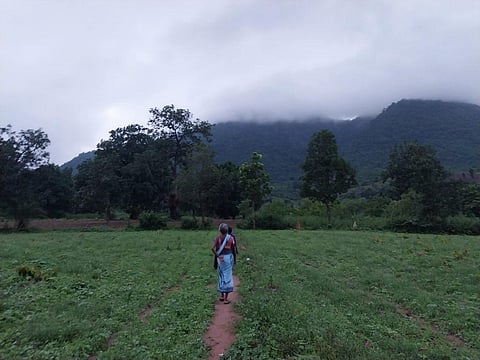

In Odisha’s Rayagada district, the Kondh tribal community has traditionally practised cultivation on dongar or upland plots, which are situated on hill slopes. Like the bewar in Madhya Pradesh’s Dindori district, dongar too is a mixed cropping system where multiple crops like millets, pulses and oilseeds are grown together. But due to the spread of monoculture, especially eucalyptus, the age-old dongar practice is now in danger.
A transformation has come about threatening this ancient farming practice, especially in Muniguda, Bissamcuttack and other peripheral blocks of Rayagada. “Outsiders associated with paper mills, especially from the southern states, are encouraging eucalyptus monoculture in the district, and for this purpose, lands are being leased. Though once limited only to the lowlands, eucalyptus has reached the middle level (midlands) as well as the uplands. But its impact is being felt more on uplands. In the uplands, there is uncultivated foods like tubers, which is actually reducing,” said Jagannath Manjhi. Where eucalyptus is grown, birds keep away, he observed.
To preserve the traditional form of dongar cultivation in Rayagada, a district dominated by hills, non-profit Living Farms is working in about 200 villages of the district. The organisation is working with the Talia Kondhs and the Kutia Kondhs to protect as well as revive dongar. “Dongar cultivation is in danger due to the dominance of eucalyptus,” added Manjhi, who works in Rayagada as a field coordinator for the non-profit.
Eucalyptus takes up to five years to mature. Meanwhile, farmers who give up their lands on lease get a meagre amount in return. It is only Rs 3,000 for an acre. At some places, it is Rs 1,500-Rs 2,000. Their source of food also gets compromised. Eucalyptus grown for supply to paper mills poses a direct threat to the cultivation of millets grown on dongar lands, especially in the midlands. Monoculture is also leading to soil infertility and water shortage. In such a situation, awareness drives are on among the Kondh communities to make them understand that the traditional dongar system is climate resilient and should be retained.
Manjhi conducts awareness drives on a regular basis. The non-profit is making the tribal communities aware about the importance of dongar cultivation which can fight climate change in uncertain times. “However, I cannot reach every village all the time, as monoculture is widespread across the district. Eucalyptus is a threat to the cultivation of traditional crops grown on dongar lands. It is grown only for commercial purposes,” he explained.
A study says that being perennials, plantation crops are affected by climate change than annuals or biennials. As a result, corrective measures for mitigating its negative impacts require long-term approaches and demand entirely different strategies. According to Manjhi’s colleague Bichitra Biswal, the rate at which eucalyptus plantations are replacing the age-old cultivation dongar system, the Kondh community will face food crisis in future. “Plantations are monocultures, and monocultures are not good in view of a changing climate.” Biswal said the focus is on food sovereignty and forest conservation to protect dongar lands.
“Paper mills are behind the promotion of eucalyptus. Farmers in Rayagada are being urged to revive traditional farming on dongar plots. At the same time, they are also reviving seed conservation practice and rejecting chemical use. Elders in the villages are sharing their experiences of traditional farming, which is organic and natural.” Biswal recalled that at one point of time, seed and labour exchange practices were close to the tribal way of life. It is time to revive them.
The International Year of Millets was observed in 2023 to champion millets, which are climate-resilient ancient grains. However, as a result of monoculture, millets once cultivated in the mid lands and uplands, are being replaced by not only eucalyptus but also BT cotton. Biswal explained that most land plots are usually with non-tribals. Traditionally, tribal farmers took these lands on lease and practised dongar cultivation. But now, many landowners are giving these lands to the paper mills instead of the tribal farmers. In some cases, tribal farmers have also leased their own lands for eucalyptus.
To reach dongar plots, there is a need for a steady uphill climb. Trinath Hikaka, a resident of Boriguda village in Rayagada, pointed out that easy loan availability to cultivate eucalyptus is also behind the decline of dongar cultivation. Also, eucalyptus does not involve much care on part of farmers. Hikaka said that these upland areas have been used for cultivation since time immemorial where ploughing is not carried out and only small hand tools are used. “Eucalyptus does not need much care. So, millets, pulses like cowpea and pigeon pea and oilseeds, are being overlooked.” He cultivated tomatoes, bananas and strawberries in the low-level land. Hikaka, who keeps away from fertilisers and does organic farming, admitted that eucalyptus is ruining the soil quality. Some farmers are trying to reduce cotton monoculture by resorting to ragi millet and maize in his village.
Sibabrata Choudhury, who once worked with Living Farms, explained that there is a buy back agreement behind the cultivation of eucalyptus. “Farmers receive seedlings and fertilisers for eucalyptus. But a shift away from dongar is impacting the food habits and nutrition intake of the Kondhs. Dongar plots have diversity which is now on the decline. The youth is also turning back on dongar.”
Biswal pointed out that the Kondhs now spend limited time on dongar cultivation. So, the organisation is trying to make them aware about food security, seed conservation and preservation of ancient food systems. “The plantation system is harming farmers. My colleagues and I are trying to revive traditional agricultural practices like dongar. Ancient food systems are part of the tribal life. But today monocultures are impacting climate-smart crops like millets and other crops.”
Manjhi explained that when land comes under monoculture, food which sustains communities vanishes. “Outside food bought from markets is pricey. That is why many people rely on tamarind and PDS rice leading to the loss of nutrition.”